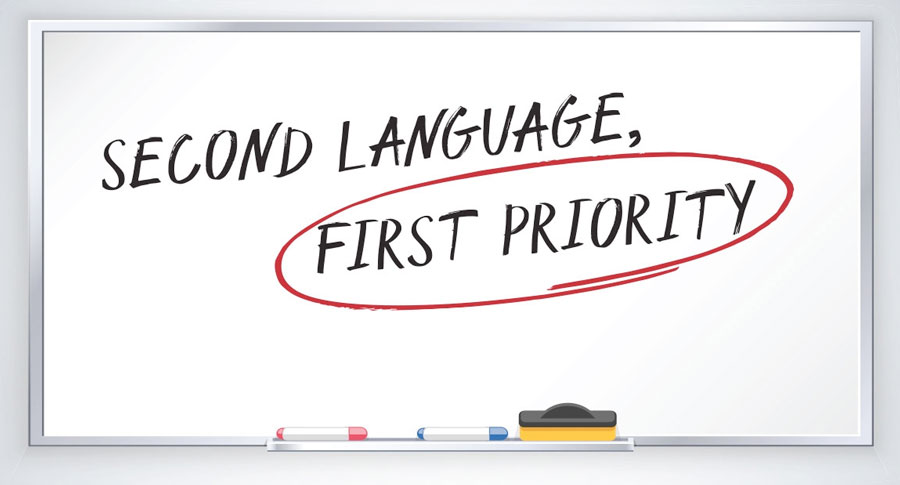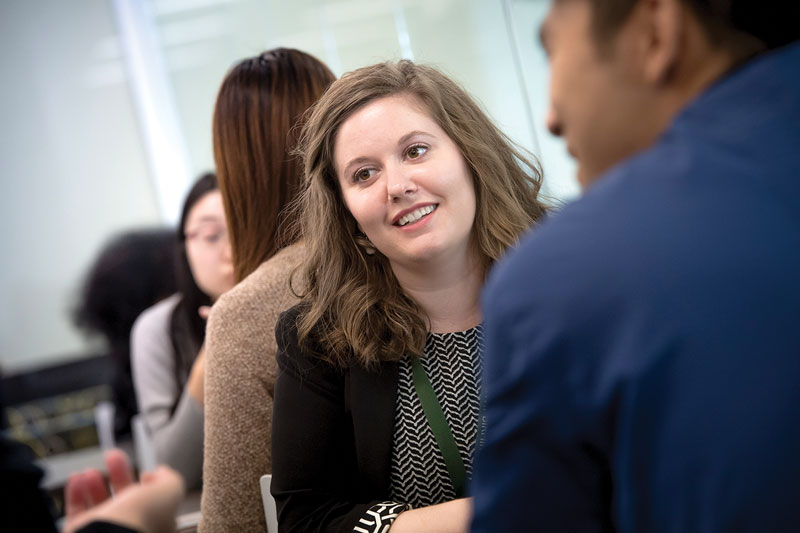Written by: UAB Magazine
Media contact: Tiffany Westry, tiffanywestry@uab.edu
 By some estimates, nearly 2 billion people worldwide will be learning English by 2020. Which means teachers of English are in demand in places such as Asia, Africa, Latin America, Europe—and Alabama.
By some estimates, nearly 2 billion people worldwide will be learning English by 2020. Which means teachers of English are in demand in places such as Asia, Africa, Latin America, Europe—and Alabama.
Simple immersion in an English-speaking classroom isn’t an effective way to learn to read and speak the language, says Kelly Hill, Ph.D., assistant professor of ESL (English as a Second Language) in the UAB School of Education. It’s a myth, she emphasizes. “There is no research to support that. The need for qualified ESL classroom teachers is growing in the public schools every year, and there are more dual-language learners.” According to the Alabama Department of Education, most of the state’s K-12 English-language learners (ELLs) primarily speak Spanish, Korean, Vietnamese, Arabic, and Chinese.
Unlocking potential
| "Teaching English is one of the most rapidly growing businesses around the world." |
UAB’s ESL program has been teaching research-proven methodologies for instructing ELLs for nearly two decades, says Susan Spezzini, Ph.D., ESL program coordinator and associate professor. “We need well-trained teachers and administrators at all levels who understand learning theories and how children learn second languages,” she says. The School of Education offers a master’s degree—with tracks for students seeking certification to teach ELLs in grades K-12 and adult ELLs—and an Educational Specialist degree for graduates wanting to become teacher leaders in the field. Master’s courses cover second-language acquisition; grammar for ESL teachers; strategies for teaching math and science to ELLs; methods for teaching adult learners; and the linguistic, educational, psychological, and sociocultural factors that impact literacy development in English.
“One class allowed us to work in a professional learning community off campus, and my student-teaching internship took place at Valley Elementary School and Pelham High School,” says 2014 graduate Julie Paul. The Gadsden, Alabama, native came to UAB from Madrid, Spain, where she had taught English to kindergarten and 11- to 14-year-old students at a private academy. “After about four months there, I knew I needed to further my education. I didn’t feel fully equipped to teach some of my more advanced students, and I wanted to know more about language acquisition.
“I could not have reached my potential as an ESL teacher without the knowledge and academic rigor required from this program,” Paul says. “When I began working in Birmingham City Schools after graduation, I frequently referred to textbooks and notes from my classes.” Today Paul is back at UAB, working as an ESL grant coordinator.
Statewide impact
In 2017 UAB won $5 million in federal grants that will benefit both new and experienced teachers across Alabama, as well as the pre-K and K-12 ELLs in their classes. Spezzini is principal investigator for one of the grants, Project Consortium for Responsive Education and Successful Teaching (CREST), a partnership of the UAB School of Education, Attalla City Schools, Gadsden City Schools, the Etowah County Board of Education, and St. James Catholic School in Gadsden.
Project CREST will award tuition support to 48 pre-service teachers so that they can earn an ESL master’s degree. In addition, 288 teachers will receive professional development in ESL. All courses will be taught on Saturdays, online, in summer, and through professional learning communities. One course is designed to help teachers engage families and communities of ELL students, Spezzini says. The goal is to help those families understand how schools function in the United States, and how parents can be involved in their children’s education.
Hill is principal investigator for the second grant, Improving Preschoolers’ Acquisition of Language through Coaching Teachers and Professional Development, or IMPACT-PD. Now in its second year, the grant supports a partnership between UAB and the Alabama Department of Early Childhood Education to give 208 pre-K teachers ESL training, including courses for those seeking degrees in the field. Online professional development courses for classroom teachers will explore stages of language acquisition, language and literacy development, best environments for learning a language, and strategies for parent engagement.
The community can take part in this work, Hill says. She is seeking assistance to pay for supplies for a free, monthlong IMPACT-PD summer program for young ELLs and teachers in training. She also is accepting donated children’s books for young ELLs.
 Meghan Gilliland applies her ESL education to help international students pursuing UAB degrees.
Meghan Gilliland applies her ESL education to help international students pursuing UAB degrees.
Around the world and back again
UAB ESL students and alumni currently teach in nearly a third of Alabama’s school systems. They also work in places as far-flung as Austria, Ecuador, China, Colombia, Ivory Coast, Japan, South Korea, and the Kingdom of Tonga.
“Teaching English is one of the most rapidly growing businesses around the world,” says Spezzini, who taught abroad herself as a Peace Corps volunteer in Paraguay in the 1970s. “Many parents overseas want their children to learn English,” and place them in language schools or hire tutors. But adults are enrolling in similar programs as well.
UAB ESL students wishing to teach adult international students complete several practicums at local public schools, faith-based organizations, and the School of Education’s free community English classes, where area residents can learn English and practice speaking it. During her first semester in the master’s program, Meghan Gilliland, of Tupelo, Mississippi, taught the community English classes, which have attracted learners from more than 40 countries. Later, she mentored other graduate students leading the classes. She also served as an ESL specialist at the University Writing Center. These opportunities “built up my confidence early and helped me to apply the information they gave us in class,” Gilliland says.
The 2015 graduate now works as coordinator of the Learning Resource Center for INTO UAB, an initiative that promotes global diversity on campus and provides English language classes and pathway programs for international students preparing to enter undergraduate or graduate programs. Gilliland recruits tutors from the ESL master’s program to teach English.
“I love interacting with the students every day,” Gilliland says. “And it’s encouraging to see the tutors building their own teaching skills with students in one-on-one sessions. It’s rewarding for both.”